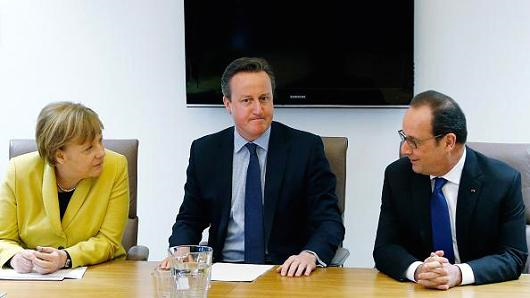
June 28, 2016

UK-EU divorce: Tensions running high over painful separation
Holly Ellyatt
7 Hours Ago - CNBC.com
June 27, 2016
If the U.K.'s decision to leave the European Union (EU) wasn't enough to damage relations with the continent, tensions are now running high over how long the U.K.-EU divorce will take and when the separation procedure could and should start.
The U.K. has said that it will wait until October before triggering Article 50 of the Lisbon Treaty which starts the process of withdrawal from the EU's political and economic bloc – but European leaders want the process to start immediately to limit economic uncertainty unleashed by the vote.
Crucially, both the U.K. and EU are keen to maintain the upper-hand in the ensuing talks and, as such, a stand-off could be on the cards. The U.K. said it would not enact Article 50 until it had talked to its European neighbors about what its "new arrangements," as U.K. Finance Minister George Osborne said on Monday , with the continent will look like.
Likewise, there is widespread consternation from remain politicians and voters in the U.K. about the result – with many taking hope from the fact that Article 50 has yet to be triggered.

Francois Lenoir - Pool/Getty Images
(L-R) Germany's Chancellor Angela Merkel, Britain's Prime Minister David Cameron and France's President Francois Hollande.
Several leaders on the continent have said there will be no negotiations until Article 50 is triggered and want the EU to leave "as soon as possible," however. There are also calls for the EU to make the divorce as unpleasant as possible for the U.K. to deter other member states from following suit. European leaders are concerned about a rise in populist, anti-EU sentiment in the bloc and fear a chain reaction from a Brexit.
The majority of U.K. voters elected to leave the EU last Thursday, voting 52 percent to 48 percent for a Brexit, shocking global leaders and sending a shockwave around financial systems with an estimated $2 trillion in paper wealth lost , according to data from S&P Global, eclipsing even the worst seen in the financial crisis of 2008.
Competing forces
U.K. Prime Minister David Cameron resigned after the result but said he would stay on until October when the Conservative Party conference is held. It is hoped a new leader can be elected then who will take charge of withdrawal process .
There is little appetite in Europe to delay the Brexit, however. European Commission President Jean-Claude Juncker said after the result that the process for Britain's withdrawal from the EU should begin "immediately" and French President Francois Hollande said there was "no going back" on the decision.
The German Chancellor Angela Merkel has called for calm, however, saying that the EU shouldn't draw "quick and simple" conclusions from the result. Donald Tusk, president of the European Council, also said it was not a moment for "hysterical reactions."
Merkel is due to meet with Hollande, Tusk and Italian Prime Minister Matteo Renzi in Berlin on Monday to discuss the next steps to take and David Cameron is travelling to Brussels on Tuesday where pressure is expected to be applied over the timing of a withdrawal.
Matthew Elliott, the chief executive of the Vote Leave campaign told CNBC that there was no need to rush the process. "I think quite rightly the prime minister has paused on that," he told CNBC on Monday.
For others, the content of the negotiations is key. Carsten Nickel, senior vice president at risk consultancy Teneo Intelligence, told CNBC on Monday that a solution would be arrived at if both the U.K. and EU compromised.
"I think that in the end it's going to be a typical European outcome, you have to find a solution and a middle ground and I think that is down to Angela Merkel … there needs to be a solution between the two ends of the debate – between the ones that want to move really quickly and the others who say 'let's take this easy and let's not rush to conclusions'."
Nickel said there were now "competing forces" at work in the EU with leaders split over the direction of the bloc – towards more political union (a founding EU principle) or more economic unity as a single market.
"There are really competing forces here, some will say that we need to consider this (EU) project as a single market and others say that we need to hold onto the idea of a political union. The key issue for me is that no one has really spent any time on thinking about how we move forward. They need to come up with answers now," he said.
He added that while the EU needed to strike a balance between maintaining economic ties with the U.K. and not jeopardizing the European project as a whole, the U.K. also needed to know exactly what it wanted from Europe.
"First of all, what the U.K. needs to do is make up its own mind about the single market - if you want to remain a member of the single market then you have to accept freedom of movement and that means immigration. That is the fundamental trade-off that no one has really thought about in the U.K. They need to make up their minds and that will inform how much they're able to get back in terms of economic integration from the European side."
Click on Link:
http://www.cnbc.com/2016/06/27/uk-eu-divorce-tensions-running-high-over-painful-separation.html







